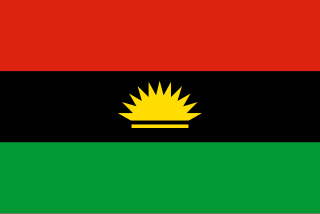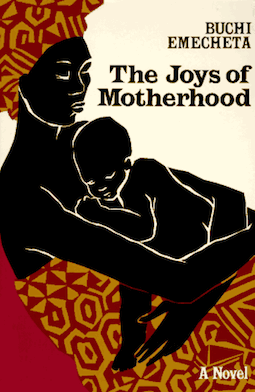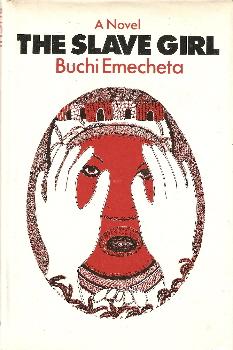
Biafra, officially the Republic of Biafra, was a partially recognised state in West Africa that declared independence from Nigeria and existed from 1967 until 1970. Its territory consisted of the former Eastern Region of Nigeria, predominantly inhabited by the Igbo ethnic group. Biafra was established on 30 May 1967 by Igbo military officer and Eastern Region governor C. Odumegwu Ojukwu under his presidency, following a series of ethnic tensions and military coups after Nigerian independence in 1960 that culminated in the 1966 anti-Igbo pogrom. The Nigerian military proceeded in an attempt to reclaim the territory of Biafra, resulting in the start of the Nigerian Civil War. Biafra was formally recognised by Gabon, Haiti, Ivory Coast, Tanzania, and Zambia while receiving de facto recognition and covert military support from France, Portugal, Israel, South Africa and Rhodesia. After nearly three years of war, during which around two million Biafran civilians died, President Ojukwu fled into exile in Ivory Coast as the Nigerian military approached the capital of Biafra. Philip Effiong became the second president of Biafra, and he oversaw the surrender of Biafran forces to Nigeria.

Florence Onyebuchi "Buchi" Emecheta was a Nigerian-born novelist, based in the UK from 1962, who also wrote plays and an autobiography, as well as works for children. She was the author of more than 20 books, including Second Class Citizen (1974), The Bride Price (1976), The Slave Girl (1977) and The Joys of Motherhood (1979). Most of her early novels were published by Allison and Busby, where her editor was Margaret Busby.

Chimamanda Ngozi Adichie is a Nigerian writer, novelist, poet, essayist, and playwright of postcolonial feminist literature. She is the author of the award-winning novels Purple Hibiscus (2003), Half of a Yellow Sun (2006) and Americanah (2013). Her other works include the book essays We Should All Be Feminists (2014); Dear Ijeawele, or A Feminist Manifesto in Fifteen Suggestions (2017); a memoir tribute to her father, Notes on Grief (2021); and a children's book, Mama's Sleeping Scarf (2023).
African literature is literature from Africa, either oral ("orature") or written in African and Afro-Asiatic languages. Examples of pre-colonial African literature can be traced back to at least the fourth century AD. The best-known is the Kebra Negast, or "Book of Kings" from the 14th century AD. Another well-known book is the Garima Gospels, one of the oldest known surviving bibles in the world, written in Ge'ez around 500 AD.

The Bride Price is a 1976 novel by Nigerian writer Buchi Emecheta. It concerns, in part, the problems of women in post-colonial Nigeria. The author dedicated this novel to her mother, Alice Ogbanje Emecheta.

The flag of Biafra, used by the Republic of Biafra during the Nigerian Civil War (1967–1970), consists of a horizontal tricolour of red, black, and green, charged with a golden rising sun over a golden bar. The eleven rays of the sun represent the eleven former provinces of Biafra. The rays are typically long and slender with the lowest rays being nearly horizontal and the remaining rays spread evenly between.

Catherine Obianuju Acholonu was a Nigerian author, researcher and political activist. She served as the Senior Special Adviser (SSA) to President Olusegun Obasanjo on Arts and Culture and was a founder-member of the Association of Nigerian Authors (ANA).

Florence Nwanzuruahu Nkiru Nwapa, was a Nigerian author who has been called the mother of modern African Literature. She was the forerunner to a generation of African women writers, and the first African woman novelist to be published in the English language in Britain. She achieved international recognition with her first novel Efuru, published in 1966 by Heinemann Educational Books. While never considering herself a feminist, she was best known for recreating life and traditions from an Igbo woman's viewpoint.

Half of a Yellow Sun is a novel by Nigerian author Chimamanda Ngozi Adichie. Published in 2006 by 4th Estate in London, the novel tells the story of the Biafran War through the perspective of the characters Olanna, Ugwu, and Richard.

The Thing Around Your Neck is a short-story collection by Nigerian author Chimamanda Ngozi Adichie, first published in April 2009 by Fourth Estate in the UK and by Knopf in the US. It received many positive reviews, including: "She makes storytelling seem as easy as birdsong" ; "Stunning. Like all fine storytellers, she leaves us wanting more".

The Joys of Motherhood is a novel written by Buchi Emecheta. It was first published in London, UK, by Allison & Busby in 1979 and was first published in Heinemann's African Writers Series in 1980 and reprinted in 1982, 2004, 2008. The basis of the novel is the "necessity for a woman to be fertile, and above all to give birth to sons". It tells the tragic story of Nnu-Ego, daughter of Nwokocha Agbadi and Ona, who had a bad fate with childbearing. This novel explores the life of a Nigerian woman, Nnu Ego. Nnu's life centres on her children and through them, she gains the respect of her community. Traditional tribal values and customs begin to shift with increasing colonial presence and influence, pushing Ego to challenge accepted notions of "mother", "wife", and "woman". Through Nnu Ego's journey, Emecheta forces her readers to consider the dilemmas associated with adopting new ideas and practices against the inclination to cleave to tradition. In this novel, Emecheta reveals and celebrates the pleasures derived from fulfilling responsibilities related to family matters in child-bearing, mothering, and nurturing activities among women. However, the author additionally highlights how the "joys of motherhood" also include anxiety, obligation, and pain.

Ifeoma Okoye is a Nigerian novelist. She has been referred to by fans as "the most important female novelist from Nigeria after Flora Nwapa and Buchi Emecheta," according to Oyekan Owomoyela. She was born in Anambra State in Eastern Region, Nigeria. She went to school at St. Monica's College in Ogbunike to receive a teaching certificate in 1959. She then graduated from the University of Nigeria in Nsukka to earn a Bachelor of Arts honours degree in English in 1977. She wrote novels including Behind the Clouds, children's novels and short stories, such as The Village Boy and Eme Goes to School.

Obioma Paul Iwuanyanwu known mononymously as Obiwu, is a Nigerian-American writer and professor. He is a survivor of the Igbo genocide in Nigeria (1966–1970), and teaches World Literature and Critical Theory in the Humanities Department at Central State University.
Charry Ada Onwu-Otuyelu is a Nigerian literature writer and the first female Director of Imo State Council for Arts and Culture. She is from Amaigbo in Imo State. She is a fiction writer of children's literature. She is an ex-soldier that worked with the Armed Forces medical service during the Biafran war. Her themes include folktales and history.

The Slave Girl is a 1977 novel by Nigerian writer Buchi Emecheta that was published in the UK by Allison and Busby and in the US by George Braziller. It won the Jock Campbell Award from the New Statesman in 1978. The novel was Emecheta's fourth book; it was dedicated to her editor Margaret Busby.

There Was a Country: A Personal History of Biafra is a personal account by Nigerian writer Chinua Achebe of the Nigerian Civil War, also known as the Biafran War. It is considered one of the defining works of modern African non-fiction. Released in October 2012, six months prior to Achebe's death, it is the author's last published book.

Second Class Citizen is a 1974 novel by Nigerian writer Buchi Emecheta, first published in London by Allison and Busby, where her editor was Margaret Busby. It was subsequently published in the US by George Braziller in 1975. A poignant story of a resourceful Nigerian woman Adah who was belittled by everyone.While growing up her parents especially her father did not really want to send her off to school he thinks a woman's education is going to end up in her husband's kitchen Unlike her junior brother boy who was sent to school at an early age, after an incident she was allowed to go to school well what did you know she was a bright student after all after her primary school education she then proceeded to go to her secondary school ,she graduated from her secondary school she got married without a ring but she loved her husband Francis dearly she thinks she's going to be treated well by her husband Francis. He did treat her right ,but as soon as they got to London he changed towards her and her children Adah being a strong woman did not rely on her husband she overcomes strict tribal domination of women and countless setbacks to achieve an independent life for herself and her children, the novel is often described as semi-autobiographical. The protagonist Adah's journey from Nigeria to London – where despite atrocious living conditions and a violent marriage, she "finds refuge in her dream of becoming a writer" – follows closely Emecheta's own trajectory as an author.
Pauline Ada Uwakweh is a Nigerian writer and academic. Writing as Pauline Onwubiko, she published Running for Cover (1988), a children's novel giving a child's-eye view of the Nigerian civil war. She is a Professor of Literature in the English Department at North Carolina A&T State University. Her specialism is African writing and literature from the African diaspora, particularly women's writing.
In the Ditch is a 1972 novel written by Nigerian writer Buchi Emecheta. It was first published on New Statesman as a regular column then published in 1972 by Allison & Busby in London, where her editor was Margaret Busby.
Florence Onyebuchi Orabueze is a poet, writer and a Nigerian professor of English and literary studies. She was a former director of the Institute of African studies of the institution, the founder of the Grace Uzoma Okonkwo Foundation and a member of Nigerian Academy of Letters.













